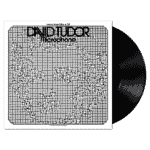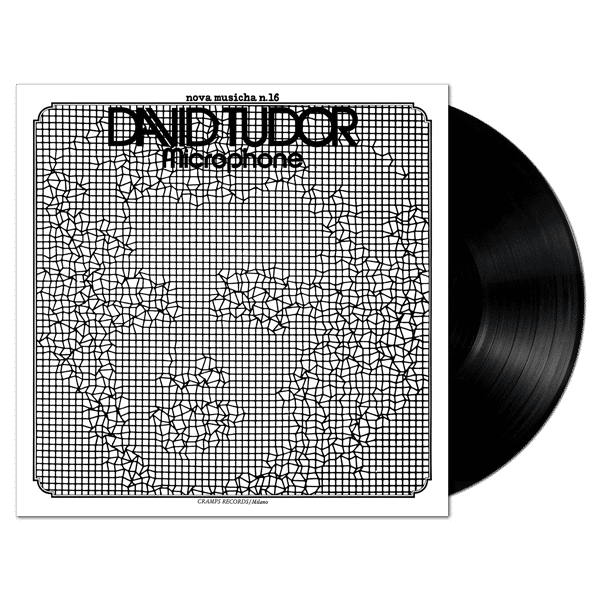At long last, after decades out of print, the Milan based imprint, Dialogo, dives into the legendary catalog of Cramps, bringing forth the first ever vinyl reissue of David Tudor’s legendary LP, “Microphone”, part of an ongoing initiative dedicated to bring the imprint’s seminal output back into the light. Still mind-blowing nearly half a century after it was first released, now complete with a new English translation of the album’s original liner notes, this is just about as exciting as reissues come and not to be missed.
Edition of 500 LP on black vinyl. Audiophile pressing. Gatefold cover, including printed inner. Perfect replica of the original packaging (with additional translated liner notes) and newly remastered for optimal sound.
Of all the historic labels associated with experimental music, few have garnered as much affection, or as devoted a following, as the Italian imprint Cramps. Its catalog reads like a who’s who of the 1970s musical avant-garde, housing seminal albums by John Cage, Gruppo di Improvvisazione Nuova Consonanza, Giusto Pio, Demetrio Stratos, Juan Hidalgo, Robert Ashley, Walter Marchetti, Cornelius Cardew, Raul Lovisoni / Francesco Messina, Alvin Lucier, Derek Bailey, and so many more, the vast majority of which have remained largely out of print and nearly impossible to obtain for decades. Now, at long last, the Milan based imprint, Dialogo, has begun a stunning series of vinyl reissues from Cramps’ Nova Musicha series – dedicated to contemporary avant-garde composers – beginning with David Tudor’s Microphone, originally released in 1978. Fully remastered and housed in a sleeve that beautifully reproduces the album’s signature design, complete with brand a new English translation of the original liner notes, this is a truly historic event.
For its impact, Cramps was a relatively short-lived endeavor, running for roughly seven years between 1973 and 1980. Founded in Milan by the producer, publisher, and graphic designer, Gianni Sassi – publisher of counter-cultural magazines like Bit and Frankenstein, and the designer behind numerous covers for Bla Bla, including Franco Battiato‘s Fetus and Pollution – Cramps was the pitch perfect emblem of revolutionary Italian temperaments of its era; creatively radical, globally minded, without profit motive, and bridging numerous musical idioms, from progressive rock and jazz, to some of the most forward thinking and singular expression of sonic experimentalism the world has ever seen.
Among the most beloved and sought-after albums released by Cramps – now finally reissued on vinyl by Dialogo – was the American composer and pianist David Tudor‘s Microphone, originally issued in 1978.1
Arguably the most important interpreter of experimental music during the 1950s and ’60s – shooting to fame as a result of his early performances of works by Pierre Boulez, Karlheinz Stockhausen, Morton Feldman, Earle Brown, Christian Wolff and La Monte Young, David Tudor remains most famous for his long-lasting working relationship with John Cage. To this day, the power and importance of these collaborations casts a long shadow over his own work as a composer, despite it becoming the central axis of role in his creative output, beginning in the early 1960s.
David Tudor’s own compositions almost entirely rest in the electronic realm, deploying modular devices – largely designed and built by himself – which were allowed to define both composition and performance. Building upon the innovations of Rainforest – a multimedia work that began to emerge in variations during the late ’60s and early ’70s – among the most important and famous of Tudor efforts as a composer is Microphone, which became his first recorded appearance as a solo composer, when the album was issued by Cramps in 1978.
Microphone utilizes a single sound-source, the modulation of microphone feedback produced in a distant echo chamber, sculpted in incidence and duration by narrow band filters, with numerous versions recorded simultaneously, before being spliced onto two channels, using a pan-matrix. The end result became a library of 9 stereo tapes – recorded at Mills College during 1973 – each about 32 min. long, that were used in any combination – played and stopped at any point, rewound and played again, altered in amplitude and/or equalization – during live performances or for electronic installations.
The version of Microphone that appears on this LP captures its realization in 1973 at the Pepsi Pavilion of Expo ’70, in Osaka, Japan, and derives from discoveries made through the composer’s collaboration in the design of the Pavilion’s acoustic system, which used 37 loudspeakers placed in a rhomboid grid system covering 3/4 of the sphere.
Clocking in at nearly an hour in length, once heard, Microphone rapidly emerges as one of the most striking and important works of 1970s electronic composition. Restrained and defined by exacting control on the part of the composer / performer, deep tonalities of varying durations and textures pulse with a chasmic void, as though emerging, fulling formed from a dark unknown. Time slows in unexpected and destabilizing ways, weaving a spectrum of sound from the wholly synthetic that feels strikingly connected to the organic world.
A work that leaves you on the edge of your seat from start to finish, Microphone brings the towering importance of David Tudor’s work as a composer into full focus, nearly 50 years after it was first laid to tape. Absolutely stunning and just as thrilling and ahead of its time today as it was then, it’s impossible to express how excited we are to have Dialogo’s long overdue vinyl reissue finally in our hands. As essential as any reissue comes, and not to be missed on any count.




